Looking to cook up a strong bond with your B-Mitzvah-age grandchild? Get into the kitchen together! It’s an ideal time to pass your recipes, family food ways, and stories on to the younger generation. And it’s a chance to listen to what’s on your grandchild’s mind as they prepare to become B-Mitzvah.
Grandparents often have the time and space to give grandchildren their undivided attention and focus. When cooking together, grandparents and grandchildren can share stories, confidences, and concerns as they build a more mature relationship.
Below are 7 steps to help you get cooking with your B-Mitzvah-age grandchild.
1. Consider your reasons for cooking together.
Think about why you want to share this experience with your grandchild. For example, you might want to:
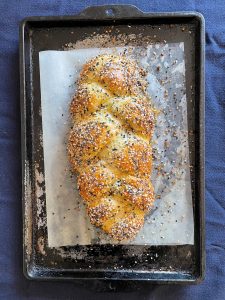 Pass on family stories and recipes. (“This was your great-grandmother’s challah recipe, and she always made it with six braids.”)
Pass on family stories and recipes. (“This was your great-grandmother’s challah recipe, and she always made it with six braids.”)- Pass on Jewish holiday traditions and food ways filtered through your own lens and whimsy. (“Every year at Purim I make hamantaschen; I use chocolate chips instead of poppyseed filling.”)
- Explain your shared heritage and how it flavors your cooking. (“Our family is from India. Let’s learn how to make the best potatoes for Shabbat — crispy outside, fluffy inside.”)
- Give your teen agency and choice. (“What are your favorite foods? What would you like to make for dinner when we cook together next Tuesday?”)
Or you might simply want to spend time with this cherished young person, get to know them better, and strengthen your relationship.
2. Plan the logistics.
After you have gently inquired if your teen is interested, extend an invitation to join you in the kitchen.
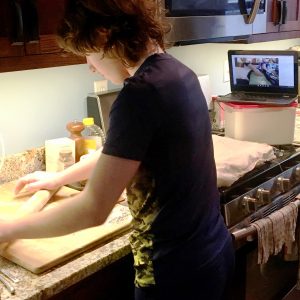 Talk to the parents (your adult child and possibly their partner) to be sure you are all in agreement. They may have helpful suggestions or can be involved with scheduling around social, school, or sports activities.
Talk to the parents (your adult child and possibly their partner) to be sure you are all in agreement. They may have helpful suggestions or can be involved with scheduling around social, school, or sports activities.
If you and your grandchild live at a distance, discuss what help you’ll need from the parents to make your cooking together work. Will you use Zoom or FaceTime or another video platform. Will a parent need to shop for ingredients or equipment? Will they need to supervise in the kitchen?
Consider these questions:
Would your grandchild like to buy the ingredients and plan the tools before the cooking begins? Take photos of the two of you cooking together or the final dishes? Set up the technology? Create an ongoing blog or post to social media?
Consider recording your session so the teen can revisit it. With their permission you might also share it with other family members. It’s also a great keepsake.
3. Choose recipes together that reflect your grandchild’s interests, family heritage, or Torah portion.
Give your grandchild control over the experience by inviting them to research and choose recipes that interest them. Or offer several recipes from which to choose. Look for recipes that keep the activity to 1½ hours in person and under an hour on FaceTime or Zoom.
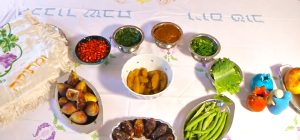
Try to include recipes that encompass multifaith and multicultural families, if that is your grandchild’s background. For example, if they are of Mexican heritage, share a recipe from the Jews of Mexico, who add local flavors and may add ingredients like garlic, cilantro, and green chilis to their matzah ball soup, or top it with onions, avocado and lime. Discuss the Ashkenazic origins of matzah balls as you make the family’s favorite “floaters” or “sinkers.” Talk about the global nature of chicken soup in Jewish cuisine, adapted by Sephardic Jews who added their own twist.
Your grandchild might like to cook a dish you create together to reflect their Torah portion. For example, this cook concocted “Joseph’s Technicolor Stew,” a dish inspired by the Torah portion Vayeshev. Or read how this author linked food and Torah.

Skip the foods they don’t like. My own sons hated cooked carrots, so making tzimmes, the carrot and vegetable stew beloved by many, would not be a good choice. Maybe they prefer pies over bread. Be flexible — this is a partnership. If you choose a food that’s new to both of you, perhaps you can both research it and share what you learned before and during the cooking session.
A B-Mitzvah-age teen can do more in the kitchen than a younger child, but if they are inexperienced cooks you may want to keep that in mind. You want a recipe that challenges but does not overwhelm your grandchild.
Resources for Jewish foods from different traditions include:
Jewish Food Society; JIMENA (Jews Indigenous to the Middle East and North Africa); Sephardic Hanukkah traditions.
You might even sign up to have a meal kit delivered each week with a recipe and pre-measured ingredients. It’s a convenient way to learn how to cook without any trips to the supermarket! Here’s one meal kit source.
4. Plan your time.
Review the chosen recipe in advance and decide which techniques you will need to demonstrate and what information you would like to share.
- Will you be talking about family history and traditions, a religious observance or holiday, or a new-to-you dish you have researched?
- Do you want to pass on techniques such as braiding challah or working with phyllo dough?
- Will you explain the importance and use of ingredients such as tahini or hawaij, the Yemeni Jewish spice mix?
 For example, different Jewish communities make dishes fried in oil for Hanukkah. As you cook you can review the story of Hanukkah, the stories of your own family, and the cooking techniques that have changed over the generations.
For example, different Jewish communities make dishes fried in oil for Hanukkah. As you cook you can review the story of Hanukkah, the stories of your own family, and the cooking techniques that have changed over the generations.
Potato latkes are a favorite in our family. I might share how my grandmother hand-grated potatoes; my mother used a blender; and now I use a food processor. I would demonstrate how I wring out the extra liquid in the batter before frying. I might share how potatoes got to the old world, how latkes got to the new world, and encourage experimentation with different toppings!
If time is an issue you might want to do a practice run-through before you cook with your teen to check workflow and timing. Demonstrating techniques and including storytelling to the recipe adds time. Make your stories short and involving. The whole experience should be fluid and fun for both of you! Allow time for conversation and confidences.
5. Get cooking.
Make the activity as hands-on as your grandchild wants. Some teens want to plunge in and chop, shape, or knead for themselves. Others might prefer to watch. Are they having trouble shaping the knishes or forming the bourekas? Stop and help them or suggest an alternative method. Try not to take over; rather guide your teen through it.
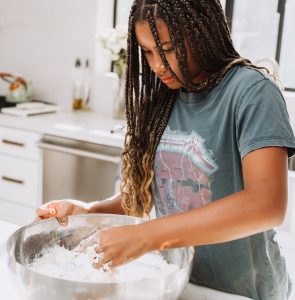
Be sensitive to what your grandchild has to say even if it’s not related to cooking. This is your time to chat and bond. Their conversation might range from the cooking at hand to what’s happening at school; the antics of their cats or dogs; what their friends are up to; or deeper concerns. Perhaps ask them about their favorite TV shows or sports to keep them engaged. Find out how they feel about being a B-Mitzvah. Talk about your own B-Mitzvah experiences. Cooking lets the conversational juices flow!
6. Plan for long-distance challenges.
Working online has its own challenges. It may be harder to establish a back-and-forth conversation. It may be difficult to teach certain techniques. Technology glitches can be frustrating.
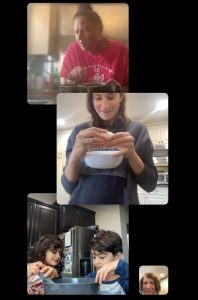 Besides the ingredient and equipment list and set-up instructions, make sure your grandchild knows what needs to be done in advance (preheating the oven, washing and chopping produce, laying out dishes). Before you begin, set up your camera, phone, computer, or tablet, and check out camera angles and audio. Adjust the angle as you go along to make sure any special steps or techniques, such as how to roll out the cookie dough, are visible on camera.
Besides the ingredient and equipment list and set-up instructions, make sure your grandchild knows what needs to be done in advance (preheating the oven, washing and chopping produce, laying out dishes). Before you begin, set up your camera, phone, computer, or tablet, and check out camera angles and audio. Adjust the angle as you go along to make sure any special steps or techniques, such as how to roll out the cookie dough, are visible on camera.
![]() Click HERE for more tips for cooking together when you are separated by distance.
Click HERE for more tips for cooking together when you are separated by distance.
7. Evaluate when you are done.
With your grandchild, assess what was a success and what needed work. Thank your grandchild and their parent(s) and invite the adults’ feedback.
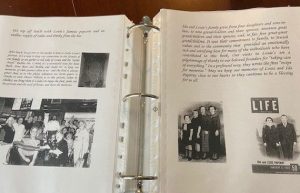
Decide if you’re going to cook together in an ongoing process. If so, when will your next session be? Who will be responsible for the next recipe? Be sure to ask your grandchild if they would like a copy of the recipe. Perhaps they will one day teach it to their own family! You might like to keep all your recipes together in your own family cookbook.
Discuss whether you would like to create a family cookbook.
And here’s an example of a cookbook-making website.
Cooking together can be exciting and gratifying. Best of all, you’ll have something tasty to sample on the spot, and delicious memories to enjoy long afterwards.
Faith Kramer is a food writer and recipe developer concentrating on the food ways, history, and customs of the Jewish diaspora. She has written hundreds of posts about Jewish customs and food, travel, and global ingredients with accompanying recipes. Faith has taught numerous cooking classes, presented programs on Jewish customs, celebrations, and holidays, and led food-related walking tours.
She is the author most recently of 52 Shabbats: Friday Night Dinners Inspired by a Global Jewish Kitchen.
Visit FaithKramer.com for links to more of her writing about Jewish customs and food, travel and global ingredients and recipes. Or contact Faith at: faith@faithkramer.com
With gratitude to Rahel Musleah and teen reviewers Dylan Dickson and Annelia Ritter.
Photographic Credits
Banner photograph courtesy of Pexels
Challah and Latkes by Faith Kramer
Teen cooking on Zoom by Stephanie Fink
Grandparent and teen cooking and Rosh Hashanah Seder by Rahel Musleah
Teen with mixing bowl by Sadie Braunstein
Teen cooking on FaceTime by Anne Stein
Family cookbook by Ron Wolfson

